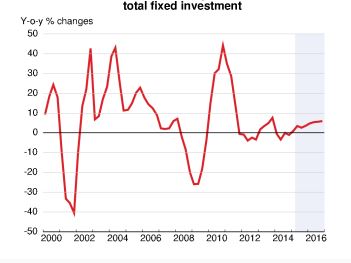4 things to know about Turkey’s economy


Get involved with our crowdsourced digital platform to deliver impact at scale
Stay up to date:
Geo-economics
Once the fastest-growing economy in the G20, Turkey suddenly has a lot on its plate: the global slowdown, the fallout from the Eurozone crisis, wars in neighbouring Iraq and Syria, terror attacks, the migrant crisis, fighting between the army and Kurdish rebels, and political turbulence.
In Sunday’s snap election, President Recep Tayyip Erdogan’s Justice and Development Party (AKP) regained the majority it lost in June, returning the country to single-party rule.
Erdogan’s party, which has held office since 2002, has been handed a strong mandate. The election result has driven up the Turkish lira – but Turkey’s economic woes are far from over. Here are four key challenges that lie ahead.
Growth? What growth?
Turkey is one of the MINT countries (Malaysia, Indonesia, Nigeria and Turkey) that were tipped to be the world’s next big emerging economies after the BRICS. It still remains one of the world’s top 20 economies – 18th according to the World Bank – but its once high-flying growth has slowed.
After reporting growth of around 9% in 2010 and 2011, the economy expanded by just under 3% in 2014. This is projected to pick up gradually over 2015 and 2016.
Currency woes
The AKP’s outright election win provided the lira with a much-needed boost on Monday – to 3%, a three-month high against the dollar. In September, the lira, one of the most vulnerable emerging-market currencies, fell to a record low. Recently, the national currency has been battered by political uncertainty, the prospect of a credit rating downgrade and a rate increase in the United States.
Fading optimism
Consumer confidence is nearing a five-year low, according to an index by Turkish Statistical Institute and Central Bank of the Republic of Turkey (CBRT). This is not surprising given that, this year, unemployment reached its highest level in five years. Three years ago it dipped below 8%, and now it’s around 11%. Meanwhile, gross domestic product per capita has been stuck at around $10,000 for several years.
Turkey’s current-account deficit is also high, although less so than in the early months of 2013.
Foreign investors’ equity holdings have fallen by $6.6 billion and their bond holdings by $13.5 billion since the start of the election cycle in March 2014, according to central bank data.
Mending bridges with the central bank
Following the election, investors will be looking for clues as to the state of relations between Erdogan’s government and Turkey’s central bank. The relationship came under strain after political attacks on the bank’s leadership. The central bank has struggled to hit its inflation target and faced criticism for raising rates. Inflation in September rose to 7.9%, above the central bank’s 5% target.
Have you read?
The case for Turkey in Europe
4 things Turkey did for business in the G20
How can Turkey narrow its gender gap?
To keep up with the Agenda subscribe to our weekly newsletter.
Author: Rosamond Hutt is a Senior Producer at Formative Content.
Image: Children playing soccer are seen through Turkish flag. REUTERS/Fatih Saribas
Don't miss any update on this topic
Create a free account and access your personalized content collection with our latest publications and analyses.
License and Republishing
World Economic Forum articles may be republished in accordance with the Creative Commons Attribution-NonCommercial-NoDerivatives 4.0 International Public License, and in accordance with our Terms of Use.
The views expressed in this article are those of the author alone and not the World Economic Forum.
Related topics:
The Agenda Weekly
A weekly update of the most important issues driving the global agenda
You can unsubscribe at any time using the link in our emails. For more details, review our privacy policy.
More on Geo-economicsSee all
Joe Myers
April 12, 2024
Simon Torkington
April 8, 2024
Joe Myers
April 5, 2024
Joe Myers
March 28, 2024
Joe Myers
March 22, 2024
Joe Myers
March 15, 2024









